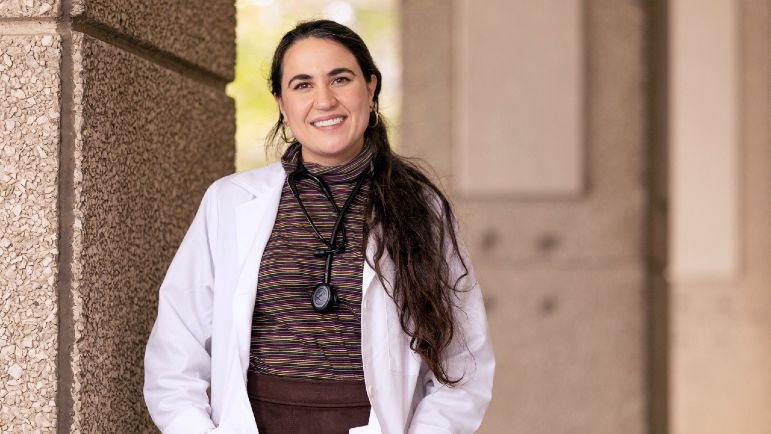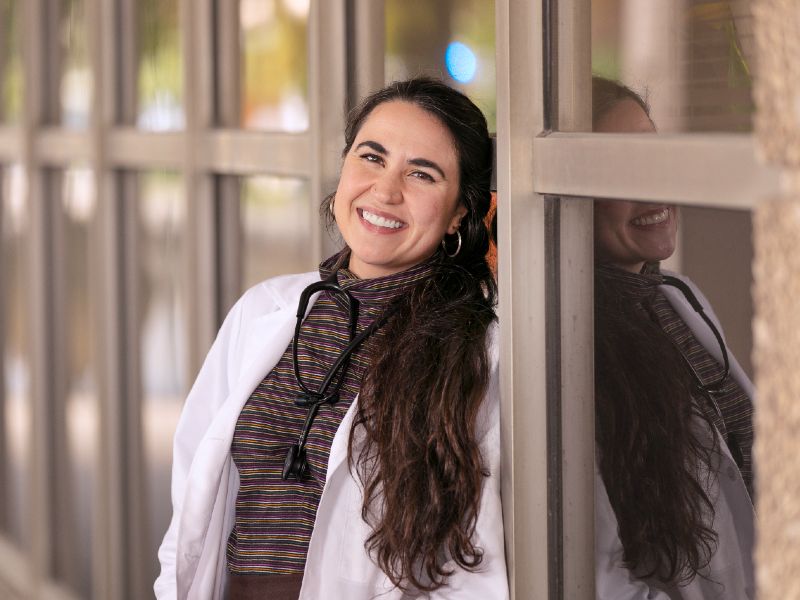Hannakate Lichota often spends her free time exploring her fascination with unusual plants. She’s also a bit of a rare bird herself.
Lichota, who is in her first year as an internal medicine resident at Rush University, took an uncommon path to — and through — medical school. She started by earning an undergraduate degree in psychology. While this differed from a hard science major such as biology or chemistry, it was a first step in finding her niche as a physician. And she excelled even while navigating the challenges of pregnancy during her third year of medical school.
She talked to us about her journey, finding a home at Rush and her interests outside of her medical career.
Tell us about your background?
Hannakate Lichota: I grew up in a small town in the heart of Texas called Belton. My path to medicine began over 50 years before I was born, when my abuelito (grandfather) immigrated to the United States from Mexico to work as an internal medicine physician.
My education began at a small college in West Texas called Abilene Christian University, with a major in psychology. This fit perfectly with my interest in patients' mental health — not only in treating mental health but also in learning about how it plays a role in medical health care.
After graduating in 2017, I immediately started medical school at Texas A&M College of Medicine. I earned my medical degree in spring 2021.
What are some of your interests other than your career in medicine?
HL: My family. My son is almost 2 years old. Together with my husband, they are my whole world. Having a child in medical school was a whole other animal, but having my family now is something I would never give up. I just adore them.
I also enjoy botany. I collect and grow some rare plants from the genus Philodendron. This has been a wonderful outlet for my creative interests, and the plants moved with us from Texas to Chicago.
Medical school is challenging enough on its own. What was it like to manage everything while pregnant?
HL: My medical school was very supportive of students with families and provided flexibility in my clerkship schedule. My school did not ask this of me, but I spent many of my weekends and holidays during my pregnancy completing extra hours in the hospital and clinic, earning the hours of my maternity leave up front to ensure I wouldn’t fall behind.
I was actually in the operating room helping surgeons for 12 hours the day before I went into labor. This was great because I was able to get to know the anesthesiologist who ended up doing my epidural.
Things changed after I had my son. I took my maternity leave and then the COVID-19 pandemic started, putting a brief pause on medical student attendance across the U.S. The fortunate result for my family was that my maternity leave was extended because no medical students were allowed in any clinical sites, per the AAMC requirements at that time.
It was difficult at times. I went through my fourth year of medical school with a pump on me at all times. But overall, I'd say it was an incredible experience. I have a very supportive husband and the best son in the world.
I wrote about my experience in my personal statement for my residency application because I wanted to be at a program that would support someone with a family. I'm very happy to say Rush is incredibly supportive.
You were a psychology major as an undergrad. What motivated you to pursue medicine?
HL: Every profession is wonderful for a lot of different reasons. I enjoyed psychology because it was both intellectual and a helping profession. I enjoyed learning about why people made the decisions they made. But I missed studying the hard sciences — chemistry, biology and physiology. So I thought, why don’t I do something that meets both of those interests?
Mental health is prevalent in every area in medicine, especially in the field I'm interested in, infectious disease. Take HIV, for example. We have research that shows that the way an initial diagnosis is framed to a patient can make a significant difference in their outcomes and adherence with treatment.
If patients feel that their new diagnosis of HIV is life-ending, they can lose hope in their future and in available treatments. But if they feel supported and feel that their new diagnosis is manageable, suddenly the motivation to remain on treatment is higher. With antiretroviral therapy, we prevent progression of HIV to AIDS, and our patients can live normal lives. With supporting the mental health of our patients, we can have some incredibly positive outcomes.
What has your experience at Rush been like?
HL: I was immediately struck by how supportive everyone is, particularly in the teaching environment. Some patient cases have been really complicated, but they’re also very interesting. Everyone is unfailingly kind to their patients and to their team. Things can get stressful, but resident wellness really seems to be a priority here.
I also appreciate greatly the diversity efforts here at Rush. Diversity is desperately lacking in medicine. We have a long way to go, but it is wonderful to participate in Rush's efforts to recruit and retain physicians who represent the patient population we're serving.
How do you see your career playing out?
HL: I’d like to advance to a fellowship in infectious disease. I’d love to be at Rush for life in its infectious disease program. There are wonderful faculty members here and a lot of research opportunities.
Hopefully some work with an HIV clinic is in my future. I want to continue with research. I'm not so much a bench research person, but I like retrospective analysis and quality improvement work.
I hope to practice at a large academic center with a diverse patient population. I want both inpatient and outpatient experiences to balance the workload and keep me sharp. I want to learn something every day.
And I’d love to teach. Students really push you to be better. If they’re asking questions and you don’t know the answer, then you both have a learning opportunity.
What advice would you give someone following a similar path?
HL: My advice would be for students who haven’t taken the straight path to medical school. Maybe you weren’t a biology or chemistry major. Have confidence in yourself. Be true to yourself as a unique applicant who brings something to the table.
Having a psychology background is seen as a soft major in some circles. But you can contribute positively to patient care no matter what you choose to learn as an undergraduate.
And work hard, but also play hard. Take some breaks. You cannot help your patients if you’re not making time for your own mental health.
Also, I try to encourage applicants of diverse backgrounds to keep on. It's a difficult road, but it's worth it. And always reach out to other people if you need help. There is no shame in seeking mental health support. You need to be your best self for your patients because they're relying on you.



